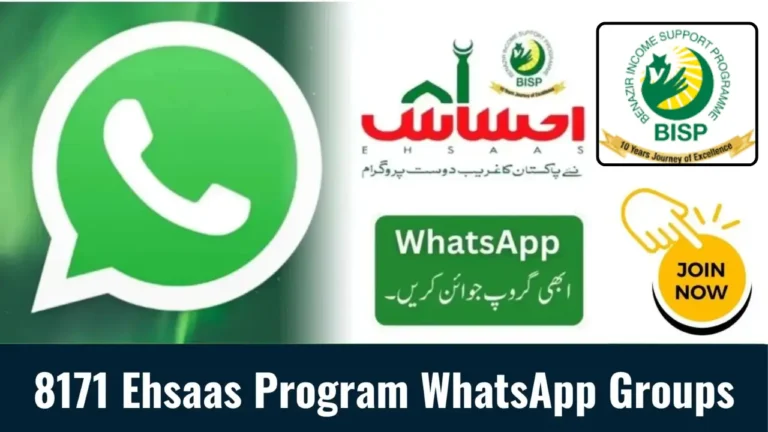Benazir Taleemi Wazaif for Orphan Children Eligibility and Payment Details
The Benazir Taleemi Wazaif program is a key social welfare initiative launched by the Government of Pakistan, aiming to support orphan children and help them continue their education. Through this initiative, the government provides financial assistance to the families of orphaned children, ensuring that they have access to schooling without the burden of economic hardship.
This article provides a comprehensive overview of the Taleemi Wazaif, including the eligibility criteria, payment details, and the application process to help potential beneficiaries understand how to access this important support.
Skills Development Fund PSDF Vacancies
What is the Benazir Taleemi Wazaif Program?
The Benazir Taleemi Wazaif is part of the Benazir Income Support Program (BISP), a broader welfare initiative aimed at combating poverty and improving the quality of life for economically disadvantaged families. This particular component of BISP is specifically focused on orphan children, offering them a stipend to support their education. The program’s main goal is to reduce drop-out rates and encourage more children to remain in school, thus fostering a brighter future for those who have lost one or both parents.
Through the Taleemi Wazaif, the government addresses a critical barrier to education: financial instability. By providing a stipend to orphaned children, the program ensures that they have the resources necessary to pursue an education without interruption. This is especially vital in a country where many children face significant financial obstacles that limit their access to schooling.
Punjab Farmers Kisan Card Reward
Eligibility Criteria for Orphan Children
To qualify for the Taleemi Wazaif, several eligibility requirements must be met. These criteria are designed to ensure that the program reaches those who need it most. Below are the primary eligibility conditions:
- Orphan Status: The child must have lost one or both parents and must be officially recognized as an orphan.
- Age Range: The child should be between 5 to 12 years of age. This is the target age group for primary education in Pakistan.
- School Enrollment: The child must be enrolled in a registered educational institution. The program encourages children to attend government schools, although children attending private institutions may also qualify.
- Income Level: The family must meet the income requirements set by the BISP. This ensures that the stipend benefits those in financially vulnerable situations.
- Required Documentation: Guardians must provide essential documentation, such as the child’s birth certificate (B-Form), proof of school enrollment, and the death certificate of the parent(s).
Government Announces Benazir Kafalat 13500
How to Apply for the Taleemi Wazaif
Applying for the Taleemi Wazaif is a straightforward process, but it requires attention to detail to ensure the application is complete. The application can be made in two ways: online or at a local BISP office.
- Online Application: Interested applicants can visit the official Benazir Income Support Program (BISP) website. The portal provides step-by-step instructions on how to register, upload the necessary documents, and check the application status.
- In-Person Application: For those without internet access or who prefer in-person support, local BISP offices are available where guardians can fill out application forms and submit required documents.
- Application Review: Once the application is submitted, BISP officials review the details and verify the eligibility. After the verification, the application is either approved or rejected, and the guardian is notified accordingly.
Payment Details for Taleemi Wazaif
The Taleemi Wazaif offers financial assistance in the form of a stipend, which is distributed on a quarterly basis. The payment is made directly to the guardian of the orphan child to ensure that the funds are used for educational purposes. Below is an overview of the payment schedule and amounts:
| Payment Frequency | Amount per Child (PKR) |
|---|---|
| First Quarter | 2,000 |
| Second Quarter | 2,000 |
| Third Quarter | 2,000 |
| Fourth Quarter | 2,000 |
The total annual stipend per child is typically PKR 8,000. These funds help cover the cost of school supplies, uniforms, and other educational expenses, allowing the child to attend school without financial stress.
How the Payment System Works
The payment of the Taleemi Wazaif is made quarterly, and guardians are notified in advance when the funds are available for collection. Depending on the region, payments can be collected from designated payment centers or transferred directly to the guardian’s bank account. For those who prefer digital payments, BISP provides an electronic payment system that ensures timely and secure disbursement.
Applicants can track the payment status and confirm whether the stipend has been processed through the BISP online portal or by visiting a local payment center.
Big News! PM Youth Laptop Scheme 2025
Benefits of the Taleemi Wazaif
The Benazir Taleemi Wazaif program provides a range of benefits, not only to orphan children but also to the broader community. Some of the key benefits include:
- Reduced Drop-out Rates: By providing regular financial support, the program helps keep children enrolled in school, significantly reducing the likelihood of school drop-outs due to financial reasons.
- Improved Access to Education: The stipend helps cover the essential costs of education, such as school fees, uniforms, and books, enabling more children to attend school regularly.
- Wider Social Impact: In addition to the immediate educational benefits, the program helps break the cycle of poverty by ensuring that orphan children have the chance to build a better future through education.
Challenges and Areas for Improvement
While the Benazir Taleemi Wazaif is a significant step toward supporting orphan children in Pakistan, there are still challenges that need addressing. One of the main concerns is the delayed payments experienced in some areas, which can disrupt the educational progress of the children. Additionally, while the amount of financial support is helpful, it may not be sufficient to cover all educational expenses, especially in urban areas where schooling costs can be higher.
Online Registration Open for Punjab Bike
Furthermore, there are issues related to awareness in rural regions, where many potential beneficiaries may not be fully informed about the application process or the program’s benefits.
Conclusion
The Benazir Taleemi Wazaif program is an essential initiative in Pakistan that helps orphan children continue their education despite financial challenges. By providing a stipend, the program alleviates some of the economic barriers that prevent children from accessing quality education. While there are challenges to address, such as payment delays and awareness gaps, the program’s overall impact is profound.
For guardians of orphaned children, applying for the Taleemi Wazaif can significantly improve a child’s access to education, ensuring they receive the support they need to build a better future. By staying informed about the eligibility requirements and payment schedules, families can make the most of this valuable initiative and help secure a brighter, more prosperous tomorrow for orphaned children.
CM Punjab Green Tractor Winners List






